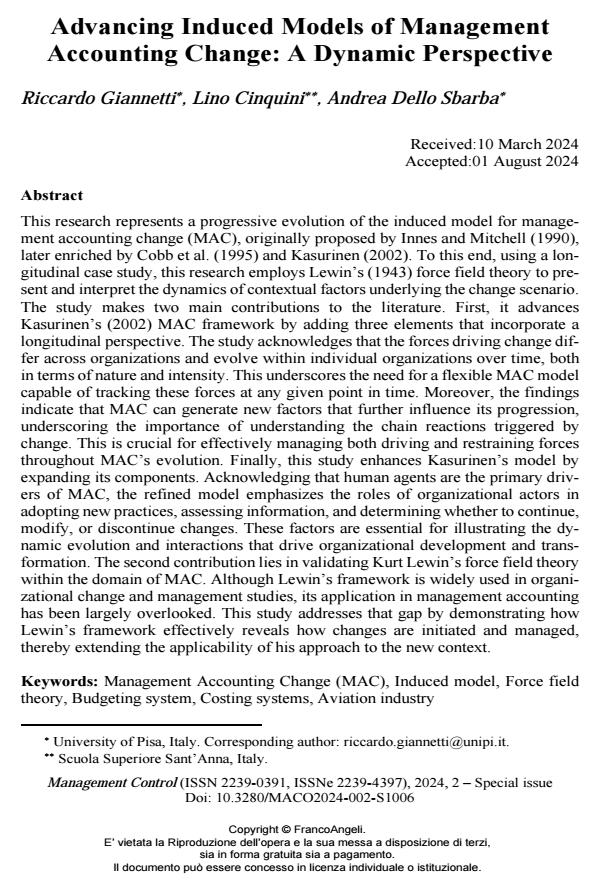Advancing Induced Models of Management Accounting Change: A Dynamic Perspective
Titolo Rivista MANAGEMENT CONTROL
Autori/Curatori Riccardo Giannetti, Lino Cinquini, Andrea Dello Sbarba
Anno di pubblicazione 2024 Fascicolo 2024/2 Suppl.
Lingua Inglese Numero pagine 26 P. 99-124 Dimensione file 527 KB
DOI 10.3280/MACO2024-002-S1006
Il DOI è il codice a barre della proprietà intellettuale: per saperne di più
clicca qui

FrancoAngeli è membro della Publishers International Linking Association, Inc (PILA), associazione indipendente e non profit per facilitare (attraverso i servizi tecnologici implementati da CrossRef.org) l’accesso degli studiosi ai contenuti digitali nelle pubblicazioni professionali e scientifiche.
This research represents a progressive evolution of the induced model for man-agement accounting change (MAC), originally proposed by Innes and Mitchell (1990), later enriched by Cobb et al. (1995) and Kasurinen (2002). To this end, us-ing a longitudinal case study, this research employs Lewin’s (1943) force field the-ory to present and interpret the dynamics of contextual factors underlying the change scenario. The study makes two main contributions to the literature. First, it advances Kasurinen’s (2002) MAC framework by adding three elements that in-corporate a longitudinal perspective. The study acknowledges that the forces driv-ing change differ across organizations and evolve within individual organizations over time, both in terms of nature and intensity. This underscores the need for a flexible MAC model capable of tracking these forces at any given point in time. Moreover, the findings indicate that MAC can generate new factors that further influence its progression, underscoring the importance of understanding the chain reactions triggered by change. This is crucial for effectively managing both driving and restraining forces throughout MAC’s evolution. Finally, this study enhances Kasurinen’s model by expanding its components. Acknowledging that human agents are the primary drivers of MAC, the refined model emphasizes the roles of organizational actors in adopting new practices, assessing information, and deter-mining whether to continue, modify, or discontinue changes. These factors are es-sential for illustrating the dynamic evolution and interactions that drive organiza-tional development and transformation. The second contribution lies in validating Kurt Lewin’s force field theory within the domain of MAC. Although Lewin’s framework is widely used in organizational change and management studies, its application in management accounting has been largely overlooked. This study addresses that gap by demonstrating how Lewin’s framework effectively reveals how changes are initiated and managed, thereby extending the applicability of his approach to the new context.
Parole chiave:Management Accounting Change (MAC), Induced model, Force field theory, Budgeting system, Costing systems, Aviation industry
Riccardo Giannetti, Lino Cinquini, Andrea Dello Sbarba, Advancing Induced Models of Management Accounting Change: A Dynamic Perspective in "MANAGEMENT CONTROL" 2 Suppl./2024, pp 99-124, DOI: 10.3280/MACO2024-002-S1006